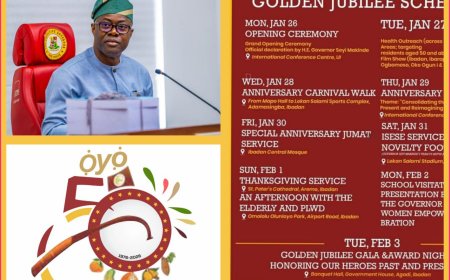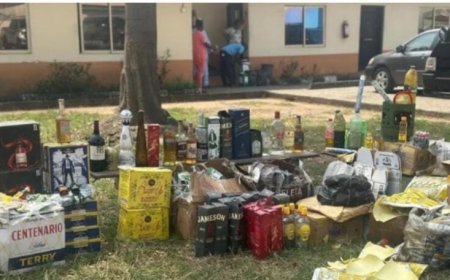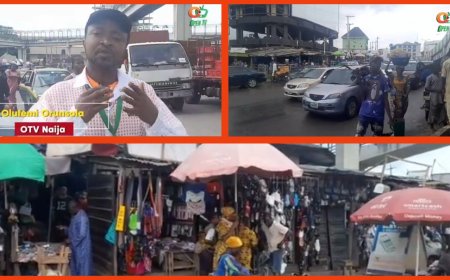SPECIAL REPORT: Incredible Ways Nigerians Strive to Survive Current Economic Hardships
As Nigeria's economy is increasingly engulfed by the trio monsters of food prices inflation, fuel price hike and dwindling fortunes of the Naira against the dollar, plunging Nigerians into depths of hunger and existential crisis, Open Television Naija (OTN) News files this special report on the incredible ways Nigerians strive to survive the harsh socio-economic realities in the country.

By: Olufemi Orunsola, AbdulWasiu Akintunde, Israel Adeleke
It is indeed no longer news that Nigeria as a country is currently engulfed in one of the most difficult times in the anals of the country's history, given the trio monsters of food prices inflation, fuel price hike and dwindling fortunes of the Naira in the exchange market.
What bewilders keen observers of current socio-economic realities in Nigeria however is the resilience of Nigerians in the face of the monstrous challenges as marked by the multiple survive strategies deployed by Nigerians who daily strive to survive the harsh socio-economic realities.
OPEN TELEVISION NAIJA (OTN) News has therefore taught it prudent to undertake an in-depth investigation into the array of measures deployed by Nigerians to survive amidst the inflationary trends, skyrocketing fuel prices,the dropping value of the naira in exchange for the dollar and the attendant pervasive hunger in the land.
In this special report, OTN News explores, in no particular order, the remarkable strategies Nigerians are using to cope with the harsh realities of the times:
1. *Trekking and the 50/50 Rule:*
With transportation costs becoming increasingly unbearable, many Nigerians have resorted to walking a significant part of their daily journeys or trips before taking a bus or cab thereafter in order to cut costs and manage meagre money available in their coffers.
This “50/50 rule” has become common in major cities, as people seek to minimize their expenses.
2. *Selling Off Personal Property:*
Faced with financial pressures, many Nigerians are liquidating personal assets such as cars, electronics, and furniture in exchange for money to cater for feeding and other urgent needs such as payment of rents or pressing health concerns.
This shift has created a growing market for Nigerian-used, second-hand goods, as people prioritize basic needs over luxury items.
3. *Eating Animal Feed:*
In some parts of the country, majorly, in the North, reports indicate that individuals, driven by desperation, have turned to consuming selected animal feeds. With food prices out of reach for many, this tragic reality underscores the severity of the economic crisis in the country.
4. *Abandoning Private Vehicles:*
Due to the prohibitive cost of fuel, many vehicle owners have parked their cars and are now opting for bicycles, tricycles, or public transportation.
This not only cuts down fuel expenses but also reduces the financial burden of vehicle maintenance on many car owners who can no longer afford the use of their privately owned cars.
5. *Skipping Meals:*
Meal-skipping has become a survival strategy in Nigeria since the military days of Structural Adjustments Programme (SAP) but now, more than ever before, millions of Nigerian families are adopting the "001, 010, 100" formula – meaning they eat once or twice a day, depending on what they can afford.
OTN News gathered from a cross section of Nigerians interviewed that this practice is widespread as families prioritize sustaining themselves on minimal resources.
6. *Home Farming for Subsistence:*
To reduce food expenses, many Nigerians have taken up small-scale farming in their homes. Poultry, rabbit farming, and growing vegetables and root crops such as pepper and cassava have become lifelines for families struggling to buy food in the market.
7. *Street Begging on the Rise:*
The sight of able-bodied men, women, and even children begging for alms is becoming more common in major cities in Nigeria where such practices were previously unheard of, let alone dominant. Once seen as an act of desperation, begging now appears to be a dignified option for many who would rather beg than steal. This is a reflection of the growing financial hardship, with individuals doing whatever it takes to survive.
8. *Working and Schooling on Alternate Days:*
To cut transportation costs, some workers only go to work three times a week, while students attend classes less frequently. This strategic reduction in commuting is helping people stretch their limited funds. The Lagos state government blazed the trail in the use of this hardship survival strategy when it officially declared that workers within certain cadres of service should only report at offices three days in a week only. Ogun State government, via a release sighted by OTN News, has followed suit, thus encouraging workers to cut costs. This practice is also been adopted by some shop owners whose houses are far from their shops or business premises.
9. *Keeping Vigils at Fuel Stations:*
With fuel prices fluctuating and supplies uncertain, some Nigerians camp overnight at petrol stations to secure fuel at official rates. Others turn to the black market, where they can sometimes find fuel at a slightly lower price. With the new pricing regime in Vogue by NNPCL retail outlets across the country, one wonders if Nigerians, especially taxi drivers and other transporters, will still see any need to keep fuel vigils again.
10. *Gatecrashing Parties for Free Meals:*
Many Nigerians have formed the habit of dressing up to gatecrash or attend social events uninvited, especially on weekends, hoping to get a free meal. This has become a notable trend, with people crashing weddings, birthdays, and other gatherings simply to eat.
11. *Emergency Street Trading:*
The streets of Nigerian cities are now filled with makeshift vendors selling everything and anything sellable, from snacks to household items.
Most roadsides have become a marketplace for those needing to earn a daily survival living but who do not previously have shops or stalls in the established market settings. More than ever before, OTN News crew o served that there are more hawkers lining up at traffic stops to sell water, plantain chips, biscuits, and other seasonal fruits just to make a living.
12. *Casual Labour as a Side Hustle:*
Both students and workers are taking on temporary manual labour jobs at construction sites and other venues to supplement their incomes.
This shift to physical labour highlights the lengths people are willing to go to secure basic needs.
13. *Prostitution and Hook-Up Culture* :
Increasing numbers of young women, students, and even many married women have turned to sex work or the now trendy "hook-up" culture, where they exchange sexual favours for money. This trend reflects the deep financial desperation felt by many who dot the landscape of major dark spots in many cities in Nigeria.
14. *Turning Private Vehicles Into Ride-Hailing Services:*
To offset the cost of fuel and vehicle maintenance, some Nigerians are using their private cars as taxis or ride-hailing services, especially on their way to and from work.
This side business helps recover part of their transportation expenses given the hiked price of fuel.
15. *Relocating Near Workplaces:*
OTN News gathered that many Nigerian workers, who live in remote areas or new sites, far from their offices now rent small apartments close to their workplaces, staying there during the week to save on transportation costs.
Meanwhile, they return to their family homes on weekends, repeating the cycle to make ends meet.
16. *Raising Rent or Evicting Tenants* :
In an effort to generate more income, some landlords have taken to arbitrarily raising rents or evicting long-term tenants to bring in new occupants at higher rates.
This practice is particularly common among housing agents seeking quick profits to survive the hard times.
17. *Selling Miracle Products:*
NAFDAC has raised concerns about a rising trend of "miracle" products being sold outside of church premises. These products, purportedly endorsed by religious leaders, claim to offer miraculous benefits, including healing, prosperity, and protection, with some falsely claiming NAFDAC approval.
18. *Money Rituals:*
Reports of ritual killings for financial gain have surged in Nigeria in recent times, with many criminally-minded individuals resorting to human sacrifices in a bid to achieve wealth.
Innocent victims, including young girls and boys, are often targeted, and this tragic practice has become more frequent as economic pressures mount. A content analysis of newspaper reports in Nigeria shows an increasing trend of ritual related killings that have sparked public outrages, with many netizens often calling for justice for such victims via social media handles.
19. *Faking Kidnappings for Ransom:*
While cases of massive kidnapping by bandits might not have been on the rise lately, some Nigerians have taken to faking their own abductions in order to extort ransom from family members or friends.
This criminal act has become a desperate means of making money, especially among young Nigerians.
In summary, the economic hardships facing Nigerians have given rise to a wide range of coping mechanisms, from genuine entrepreneurial hustles to deeply troubling survival strategies that are highly unethical and criminal in nature.
As the nation grapples with inflation, unemployment, and poverty, these adaptive behaviours reveal the lengths to which people will go to endure the challenging times.
In the light of the foregoing, the focus of OPEN TELEVISION NAIJA's flagship Reality Check Talk Show, OPEN TALK with FEMI, anchored by Ambassador Olufemi Orunsola has shifted to this existential discourse.
What's Your Reaction?























































